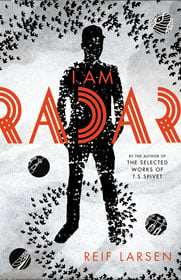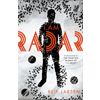This article is more than 1 year old
The Rise of Islamic State, Touch and I Am Radar
Where did ISIS come from? How do we feel? And some quantum fiction
I Am Radar
Reif Larsen is an American author best known for The Selected Works of T.S. Spivet. I Am Radar is his second novel and would seem to be a novel about quantum entanglement.
The eponymous hero is born black and is turned white for no apparent reason and is just one of many characters in this novel who are neither deep nor interesting enough to carry the erratic storyline, which follows nuclear physicists – or is it an experimental theatre group? – in a jaunt around the trouble spots of the world. The point being?
“When you can’t find something,” she said, “it may as well not exist.”
I’m all for a little experimental fiction and I Am Radar is, in places, both thought-provoking and well written, as in this observation of a Belgrade street woman: “She had the eyes of a child. She was a vagabond. A miscreant. Did others now see him this way too? When they passed him in the street, did mothers pull their children closer and avert their eyes?” It is also insightful at times: “You don’t seem like an American to me, you’re too good at listening.”

As the author says: “Everything that you do affects another person, even if you never meet him,” and “if it is not documented, it never happened”.
The main problem with this book is that it skips all over the place. Besides Radar, we have a host of characters whom the author alights upon but does not investigate at any great depth. The action seems to unfold with no purpose, reason or meaning.
For instance, take the Serbian nationalist who says “I keep telling you we come from a great people ... we’ve just lost our way, that’s all.”
He seems to be playing a cover version of Heraclitus in this phrase: “It occurred to Danilo then that all rivers were the same river.”
And a line stolen surely from Alec Guinness in The Bridge Over the River Kwai: “I see the Japanese are as fastidious with their documentation as they are with their own mortality.”
Phnom Penh, Kinshasa, Sarajevo and more, all melt into one quantumly-entangled text that overwhelms the cast of ham actors. Evidently, there is always an excuse for experimentation: “If you grow too comfortable with your book, I say dismantle it. Put it in a paper bag and heave it out the window... You have to clear the decks before you grow complacent ... change is the only force that keeps us alive.”
This book is forever moving and never changing – the concept is interesting, the characters much less so. The storylines within I Am Radar are mundane, yet hint at the infinite and are ultimately very long-winded and hard to read.
Charles Bukowksi used to pine for writers whose lives were more interesting than their works. I Am Radar gives the impression of an author who has studied and absorbed all of the tricks and theories of literary modernism, yet his observations fall short of drawing from life any coherent themes. ®
 Author Reif Larsen
Author Reif Larsen
Title I Am Radar
Publisher Harvill Secker
Price £18.99 (Hardback), £9.98 (eBook) on sale 26 March
More info Publication web site
